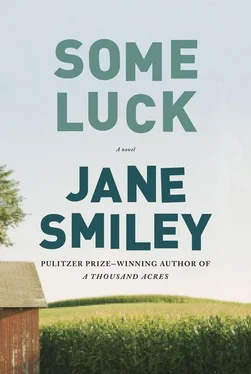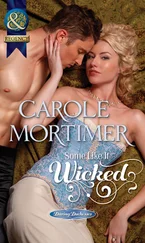She did not, however, give Irma much leeway with Mary Elizabeth (who could now be heard calling to be picked up after her nap). Rosanna set down her hemming and, when Irma looked up, gestured to her to keep on with what she was doing. Rosanna had waking nightmares of Irma falling down the stairs with Mary Elizabeth in her arms, or Irma bumping the child’s head on the edge of the cupboard, or stumbling and falling on her. These worries Rosanna acted upon, but kept to herself.
Mary Elizabeth was not as active as Frankie and not as fearful as Joey. She was willing to try some things, but not everything. Rosanna considered that she had a thoughtful look on her face. Once, before Christmas, when she was — what? — ten months old, she had crawled over to a book and picked it up. As Rosanna watched, she opened the book and began turning pages, carefully pressing her tiny forefinger against the corner of the page and pulling it down, and then taking the page between her thumb and finger, and turning it. She hadn’t torn a single page. Now she was standing in her crib, holding her arms out.
Rosanna laid her back down in the crib to change her. She was good about that, too — she had been easy to train (Rosanna always started early and went at it with dedication, because it was better in the end not to leave it too late). Now she took Mary Elizabeth’s long johns off. They were not wet, so she carried her over to the potty and sat her upon it. Mary Elizabeth was neither a bouncer nor a wiggler. When she had produced, Rosanna handed her a page from last year’s Farmers’ Almanac , then helped her with it. Really, she was an agreeable child, and she would make a useful young woman, and wasn’t that the best kind? Rosanna adored her even though she was a bit plain (Rosanna noticed this but never, ever mentioned it and was always maybe too affectionate). She in fact suited her name, Mary (common) Elizabeth (respectable). Should there be another girl, Rosanna thought, she would name her something more elegant. Dorcas? There was a Dorcas in town. Helene? Was there a Helene? But she was one of the Carsons. She had probably started life as a mere Helen. Mary Elizabeth held out her arms, and Rosanna slipped her into the romper suit she had knitted in the fall. Then she gently gripped Mary Elizabeth around the waist while the little girl slipped her feet into her shoes. Once they were tied, Rosanna walked her to the top of the stairs and held her hand as she stepped her way down them. They were steep, steeper than most stairs, so Rosanna was careful to give all of the children plenty of practice but to watch them (even Joey, nearly three, even Frankie, at five — these stairs were no joke).
Downstairs, Joey was waiting for her with his face alight. He shouted, “Mama, Mama! Look!” and gestured at the line of dominoes.
Rosanna said, “How many are there, Joey?”
Joey looked at Irma. Irma’s lips moved, and then Joey shouted, “Sixteen!”
“Sixteen! My goodness, such a lot!”
Joey said, “May Liz! Touch it!”
“Really?” said Rosanna. “You want Mary Elizabeth to knock them down?”
Joey nodded excitedly, and Irma nodded, too. Probably this was Irma’s idea. Mary Elizabeth walked over to the table and touched the first domino; they all fell in a row, and it was really quite exhilarating to see how both children enjoyed it. Rosanna said, “Joey, you’re a nice boy,” and Irma said, “Oh, yes, I think so, too.”

THIS YEAR, when the sheep-shearing men came to shear the sheep, Frank had a job. You never knew ahead of time when the sheep shearers were going to come — Papa only had twenty sheep, so the shearers would show up all of a sudden one morning, shear the sheep, stay for dinner, and then go on to a farm on the other side of town that had lots of sheep — a hundred, maybe. Always before when they came, Frank had been told not to get underfoot — he could sit on the fence and watch, but he couldn’t climb down into the pen or sneak into the barn, either, in case he got up to something when no one was looking. And it was true that Frank liked to get up to things when no one was looking, even if he did get a whipping for it. But sheep shearing was better than getting up to things. This year, his job was to jump on the wool when they put it into the sack so that they could get a lot in. It was a great job.
On the morning when the sheep shearers showed up, Mama looked out the window and saw they were there, then called to Papa out the back door. It was a sunny day, not at all damp. Papa went to the sheep shearers and talked money to them while Mama found Frank a long-sleeved shirt with a high collar. Before he went out the door, she smoothed his socks up over the bottoms of his overalls and said, “You are going to get a bath today, and I don’t want any fuss about it.” Frank jumped down the porch steps.
Felix and Harmon took turns. Daddy and Ragnar would catch a sheep, put a rope around its neck, and pull it over to the sheep shearers. Felix or Harmon then flipped the ewe over on her back and put her between his legs. First he clipped the hair off her head, then went all around her neck. Then he started on her belly and clipped from top to bottom in smooth rows. The wool fell to one side like a blanket, and the sheep got quieter and quieter, not even baaing, because Papa said that the sheep were glad to be clipped — if you let a sheep go through the summer with all that wool, it might lie down and die. They looked terribly silly without their wool, though — silly and surprised, Frank thought.
Once the fleece was lying out flat on the ground, Papa or Ragnar folded it together and rolled it up, and then put it in the sack. Here was where Frank came in — he climbed into the sack, and while Papa or Ragnar held one of his hands, he jumped up and down all over the wool. He jumped as high as he could, and almost in one place but not quite. As he did this, the one who was not holding his hand went and caught the next sheep. Frank did not want to rest, because he wanted Felix and Harmon to see what a good jumper he was. At the end of twenty sheep, it was dinnertime, and Frank was warm in the sun, and all the sheep crowded together at the feeder the way they hadn’t been able to before. After the sheep shearers left, Mama made Frank take off all his clothes and take a bath in the kitchen. When he was clean and all dried off, she took him to the window and looked him all over for ticks, and she found a few — two on his back and two on his legs and one in his hair. She held a burnt match tip against them, and they backed out. All the time she was saying, “Ugh, I hate ticks!” and Frank was very good about standing still.
EVERY YEAR, Walter said that he was going to rip out or plow up or in some way get rid of the Osage-orange hedge that separated the field behind the barn from the back acreage, and every year, he went out there with Ragnar and scratched his head for a minute and then just ended up trimming it. It was, as his father had always said, “horse-high, bull-strong, and hog-tight,” but it limited what he could do with that back field. The problem was that it was dense with thorns, a couple feet thick, and a quarter of a mile long. Every time you wanted to get into the back field, you had to go around it, because, as intended, there was no going through it. It was also a bit unusual for this area — more common down south, Walter had heard, where such hedges had been all the fashion in the middle of the last century (when, Walter supposed — the thought made him smile, it was so ridiculous — all American farmers were going to model themselves on the landed English gentry and farm the same land for generations and also fox-hunt across it). But if you replaced it with barbed wire, you had to keep your eye out for breaks in the fencing, and you had to be there to fix it before any animals got through. No animals got through the Osage-orange hedge. In fact, no animals with a lick of sense went near it. But the thing was so permanent, more permanent than the barn and the house, since it had been planted before they were constructed. Probably old Litchfield, from whom he’d bought the farm, had sited the barn where it was because of the hedge — it meant a quarter of a mile less fence to maintain. As a result, the barn wasn’t where Walter would have put it. That was another thing that bothered him about the farm. Rosanna liked the house, though.
Читать дальше













